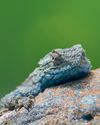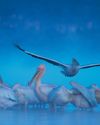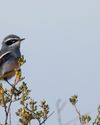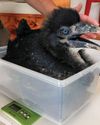
Coursers are fairly enigmatic within the order Charadrii-formes, which broadly comprises the waders, gulls and auks. Like the Plains Wanderer of Australia, they have abandoned the aquatic habitats typical of their relatives and are now semi-arid or arid-zone specialists. In particular, the Double-banded Courser Rhinoptilus africanus and Burchell’s Courser Cursorius rufus are synonymous with southern Africa’s arid Karoo and Kalahari regions.
These desert dwellers have a range of physiological and behavioural adaptations that enables them to thrive in such harsh areas, especially in relation to the lack of water. Coursers extrude salt from special glands near the nostrils in order to conserve water and they obtain all their moisture via their food. Not actively drinking makes them independent of water sources in the environment. Their long legs separate them from the hottest layer of air near the ground. Behaviourally, coursers may avoid the heat by hiding under bushes. They are fascinating birds and it is surprising that they are not better studied.
This story is from the March - April 2020 edition of African Birdlife.
Start your 7-day Magzter GOLD free trial to access thousands of curated premium stories, and 8,500+ magazines and newspapers.
Already a subscriber ? Sign In
This story is from the March - April 2020 edition of African Birdlife.
Start your 7-day Magzter GOLD free trial to access thousands of curated premium stories, and 8,500+ magazines and newspapers.
Already a subscriber? Sign In

EXPLORING NEW HORIZONS
Keith Barnes, co-author of the new Field Guide to Birds of Greater Southern Africa, chats about the long-neglected birding regions just north of the Kunene and Zambezi, getting back to watching birds and the vulture that changed his life.

footloose IN FYNBOS
The Walker Bay Diversity Trail is a leisurely hike with a multitude of flowers, feathers and flavours along the way.

Living forwards
How photographing birds helps me face adversity

CAPE crusade
The Cape Bird Club/City of Cape Town Birding Big Year Challenge

water & WINGS
WATER IS LIFE. As wildlife photographer Greg du Toit knows better than most.

winter wanderer
as summer becomes a memory in the south, the skies are a little quieter as the migrants have returned to the warming north. But one bird endemic to the southern African region takes its own little winter journey.

when perfect isn't enough
Egg signatures and forgeries in the cuckoo-drongo arms race

Southern SIGHTINGS
The late summer period naturally started quietening down after the midsummer excitement, but there were still some classy rarities on offer for birders all over the subregion. As always, none of the records included here have been adjudicated by any of the subregion's Rarities Committees.

flood impact on wetland birds
One of the features of a warming planet is increasingly erratic rainfall; years of drought followed by devastating floods. Fortunately, many waterbirds are pre-adapted to cope with such extremes, especially in southern Africa where they have evolved to exploit episodic rainfall events in semi-arid and arid regions. But how do waterbirds respond to floods in areas where rainfall - and access to water - is more predictable? Peter Ryan explores the consequences of recent floods on the birds of the Western Cape's Olifants River valley.

a star is born
It’s every producer’s dream to plan a wildlife television series and pick the right characters before filming.